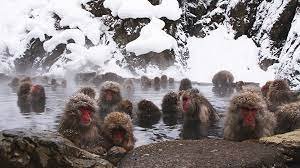I remember my trip to Singapore with another engineer when I worked for DuPont. We were picked up at the hotel each morning by a driver who would take us to the manufacturing plant. As we drove there, we would pass by open fields where we would see the monkeys going from tree to tree. I looked at the other engineer and told him, “There’s something we don’t see back home.” He laughed and said, “Come to my house. I have four kids
I had no idea Japan could be as rural as it is-with lots of monkeys. From TV, they say monkeys are very adaptive, and are great learners from each other. So, one rogue monkey might change the culture of the herd???????
The monkeys biting people story sounds like it came from someone with quite an imagination. Who thought it up?


